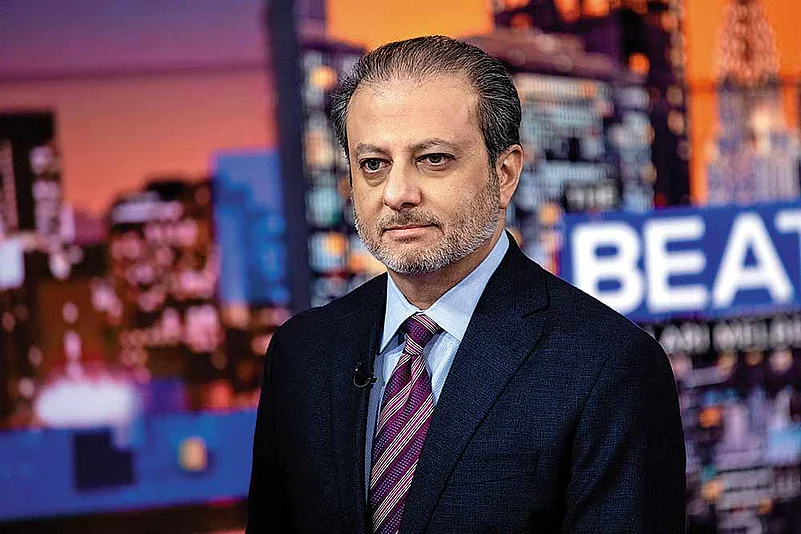India-born Preet Bharara first shot into fame in 2009 when, within months of taking over as US Attorney for the New York Southern District, he decided to prosecute Raj Rajaratnam, the manager of a seven-billion-dollar hedge fund, on securities-fraud charges. In a press conference, Bharara claimed he had unearthed the biggest insider trading fraud in US history, which would serve as a “wake-up call for Wall Street”. In following years, Bharara prosecuted an impressive list of America’s powerful, till he was summarily fired by Donald Trump in 2017. He decided to wear his dismissal as a badge of honour, turn to academics and write the memoirs of his tenure as US Attorney to tell people how, for eight years, he was “doing justice”.
Bharara divides his book into four parts and, like an enthusiastic prosecutor, titles each of them on the various stages of a criminal case. Running into 323 pages, they are ‘Inquiry’, ‘Accusation’, ‘Judgment’ and ‘Punishment’. Each begins with an introduction, followed by various chapters through which runs a common thread of thought—“law is an amazing tool, but it has limits. Good people, on the other hand, don’t have limits”. This is Bharara’s dominant thesis. To justify it, he writes about the wide variety of cases he handled as a US attorney and punctuates his stories with the perils faced by his office. Bharara prides himself in always having upheld prosecutorial ethics, applauds colleagues, expounds principles of criminal jurisprudence, questions judgments and bemoans acts of vengeance against religious minorities. In a chapter curiously titled ‘Bollywood’, he explains how he was accused of deliberately going after the Indian-American community to please his ‘white masters’. His justified anger is writ large as he details a 2013 case where an Indian diplomat was arrested by the state department for underpaying her domestic help. The arrest, he says, “caused an international incident” and, in India, “BJP…shrewdly seized upon this supposed Western insult to Indian sovereignty and caused a crisis for the Congress Party”. He laments how “an avalanche of vitriol and bile” descended on him just because he was Indian-born, even though he came to know of the case only a day before the arrest. Bharara defended his case, and perhaps because he was personally accused, defended it “loudly”.
Does Bharara ever admit to human failings? He does. But he lays the ground with elan to tell his readers that despite their human failings, he and his colleagues always kept ‘justice’ first: “We did not always get it right…. We pursued cases some people thought were overreach, and we walked away from others that some were dying to see us bring. But I can’t recall a time when we didn’t think hard about what we were doing, why we were doing it, and whether it was in the interests of justice”. The danger of some degree of self-applause is inherent in every biographical account and Bharara’s is no exception. I would have loved to read some more about the defence put forth in the cases he writes about.
Bharara’s language is conversational and his syntax pellucid. His innate compassion comes to the fore when he handles subjects like racial retaliation and his fearlessness shines when he slams the Trump administration. In some parts, his writing typifies the finesse of the always-triumphant downtown attorney we watch in American sitcoms; in others it evokes that certain sense of plainness characteristic only to the nonchalant man on New York’s streets. Bharara shifts between the two with reasonable mastery.
To point out just one ‘takeaway’ from Doing Justice, I would quote these ending sentences: “You will not find God or grace in legal concepts, in formal notions of criminal justice. Certain values and ideals are beyond justice. They include mercy, forgiveness, redemption, dignity. Also love…. The law is not in the business of forgiveness or redemption. The law cannot compel us to love each other or respect each other. It cannot cancel hate or conquer evil; teach grace or extinguish passions. The law cannot achieve these things, not by itself. It takes people—brave and strong and extraordinary people”. By writing this book at a time when dissent is being crushed and definitions of justice are changing the world over, Bharara has proved beyond reasonable doubt (to use a prosecutorial expression) that his name must go in the list of such extraordinary people for having written with the courage of conviction.
(The author is a human rights activist and author of Beloved Delhi: A Mughal City & Her Greatest Poets)





















